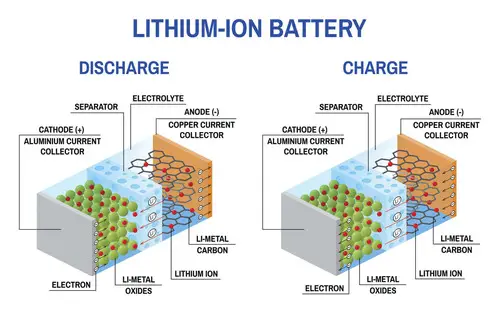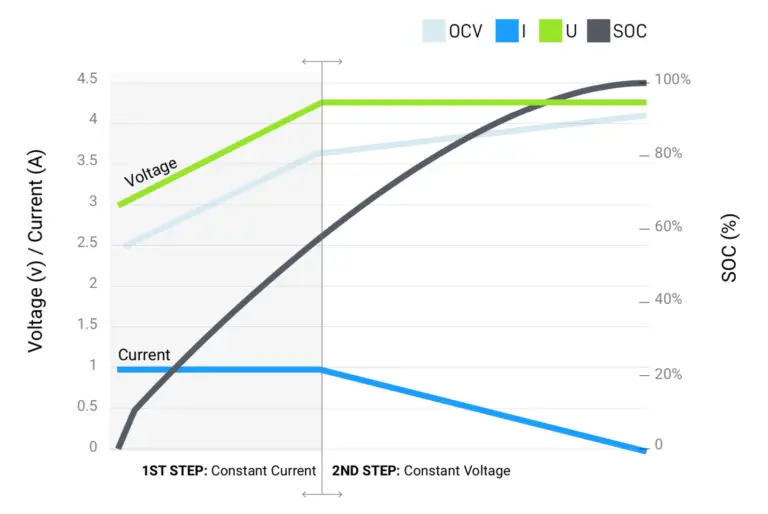Battery technology has made some drastic improvements over the past few years. We no longer feel the range anxiety as nowadays batteries are powerful enough to give you 200+ range. But one thing that general consumers are still confused about is whether they should charge their electric vehicle battery to 100% or not.
Most manufacturers suggest you charge your battery only up to 80%. Even most of the experts say that. But what is the reason? Is It Bad to Charge An Electric Vehicle to 100%? Will my battery die soon if I charge it to 100%? Will my battery degrade over time if I charge it up to 100% for a prolonged time? Let’s find the answer to all these questions here in this article.
Before we find the answer to these questions we need to understand a little bit about Lithium Ion battery technology and how it charges or more precisely how it holds the charge.
How Lithium Ion Battery Works?
Like any other battery technology, Lithium Ion battery also has a positive electrode, a negative electrode, and a chemical called electrolyte. A battery pack typically contains multiple battery cells packed in an enclosure.
The positive electrode is typically made from a chemical compound called lithium-cobalt oxide (LiCoO2) or, in newer batteries, from lithium iron phosphate (LiFePO4). The negative electrode is generally made from carbon (graphite) and the electrolyte varies from one type of battery to another.
When the battery is charging, lithium ions from the positive electrode pass through the electrolyte and go to the negative electrode and remain there. During this process, the battery stores charges.
When the battery is discharging, lithium ions travel back to the positive electrodes and during this process, it releases energy which is used to run the motor of the vehicle.
Now the big question. Is It Bad to Charge An Electric Vehicle to 100%?

Is It Bad to Charge An Electric Vehicle to 100%?
You might notice that most manufacturers recommend charging their EV batteries up to 80%. If you look into their brochure, they mention the charging time for 0-80% charge and then they mention about 0-100%.
One thing you will also notice is that 0-80% charge is very fast but from 80-100% it takes a lot of time. Why it is so?
The main reason for this is that the battery charging is not linear. When the battery is almost drained out, ions can travel at a much faster rate and that is why the battery charges very fast from 0-80%. However, beyond 80%, ions take a lot more time to travel to the negative electrode and that is why it takes more time to charge from 80-100%.
Think of a cinema hall when it is empty. It is very easy to get into and find a seat. However, when the theater is almost full, it’s very difficult to find your seat. Though a theater has nothing to do with batteries this is a logical example to explain to you how a battery behaves at different states of charge.
Now you might feel that I am okay with the extra time a battery takes to charge from 80-100%. In that case, shall I charge it to 100%? Is there any issue if I charge it to 100% apart from the extra time that it takes?
Charging A Battery Up To 100% Could Be Bad
When you charge a battery up to 100%, you are simply putting a lot of stress on the battery because the battery is operating at an extreme point. If you continue to charge 100% over some time, you might notice battery degradation. It can be catastrophic too due to the extreme heat that the battery generates when you charge it to 100%, but that is very rare in modern batteries.
Consistently charging to 100% capacity allows the growth of lithium metal tendrils known as dendrites that can cause a short circuit. The lithium ions fall out of circulation when they get caught in side reactions within the electrolyte due to the higher temperature generated from the energy stored when a battery is charged to its extreme capacity.
Occasionally charging batteries to 100% is not bad but don’t make it a practice. If you do so, you will do more harm than anything better. When you go for a long trip, charging a battery to 100% could be the need of the hour. That is perfectly fine.

You can see from the above graph that in the first step up to 20% SOC, the current flow is linear, however after that the current flow decreases against the increase of SOC. After 80% SOC, the current flow takes a drastic downward flow.
So even if you charge beyond 80%, there is not much current flow. That means it will take a lot of time to charge from 80%-100% and generally a battery will generate the most amount of heat during this charging period. That is why, it is better to avoid charging beyond 80%
Discharging A Battery To 0% Could Be Bad Too
Charging or discharging at extreme capacity, both are bad for overall battery health and longevity. The main point here is that you should not let the battery work at the extreme capacity. Discharging a battery to 0% is equally bad like charging a battery to 100%.
If you want your EV batteries to be very healthy for a longer period and don’t want them to degrade fast, always operate at 20-80% charge. This means the battery charge should not go below 20% and above 80%. This is the best charging practice for lithium-ion batteries.
How To Stop Batteries Working At The Extreme Capacity
There are multiple ways you can stop a battery from working at extreme capacity. Most modern vehicles give you an option in the dashboard to stop charging when the battery reaches 80% charge and the same can be done when the battery reaches 20% charge.
In some cases, manufacturers do that in the battery management system. They program the BMS in such a way that it will show the battery State Of Charge as 100% but in actuality, the battery charge may be only 95%. The same is true when the battery State Of Charge is 0%.
Manufacturer tries to protect the battery by automating the protection system so that their battery lasts longer. But in most cases, they won’t disclose it to consumers. That is why, it is our ultimate duty not to operate an EV battery beyond the 20-80% limit.
Conclusion: Is It Bad to Charge An Electric Vehicle to 100%?
Yes, it is bad to charge an electric battery to 100%. Occasional cases are fine but a regular practice of charging 100% could be catastrophic and will damage your battery in no time. You will soon notice battery degradation and start blaming the manufacturer without understanding the fact that it is you who is spoiling the battery life. So stop charging beyond 80% and stop discharging below 20%.